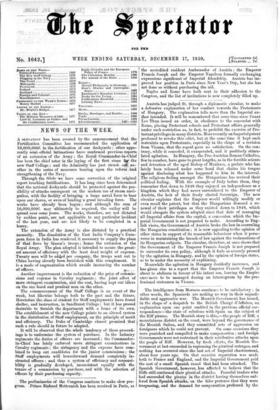Austria has judged fit, through a diplomatic circular, to make
a defensive explanation of her conduct towards the Protestants of Hungary. The explanation tells more than the Imperial au- thor intended. It will be remembered that some time since Count Leo Than issued an order, in obedience to the concordat with Rome, placing Protestant schools and Protestant affairs generally under such restriction as in fact, to prohibit the exercise of Pro- testant privileges in manidistricts. More recently an Imperial patent professed to revoke this edict, but at the same time it kept such restraints upon Protestants, especially in the shape of a revision from Vienna, that the repeal gave no satisfaction. On the con- trary, while it conceded, it exasperated, and it positively stimu- lated agitation. In Hungary, the Pro-Austrian Roman Catholics, few in number, have gone to great lengths, as in the forcible seizure and detention of the aged Bishop of Munkacs, a prelate who has lately been released under some bond that chains his tongue against disclosing what has happened to him in the interval. The religious feeling amongst the Hungarians has revived their political feeling. • With the example of Italy before them, they remember that down to .1848 they enjoyed an independence as a kingdom which they had never surrendered to the Emperor of Austria, the heir of their freely elected Sovereign. The new circular explains that the Emperor would willingly modify or even recall the patent, but that the Hungarians demand a re- newal of their privileges as they existed down to 1848, which would abrogate the system adopted since that date of managing all Imperial affairs from the capital, a concession which the Im- perial Government is not prepared to make. According to Eng- lish views, the Government of Austria broke the law in overruling the Hungarian constitution ; it is now appealing to the opinion of other states in support of its reasonable behaviour when it perse- veres in maintaining the breach of law against the reclamations of its Hungarian subjects. The circular, therefore, at once shows that the Government of the Emperor Francis Joseph is not prepared to surrender its own policy, although it feels so severely pressed by the agitation in Hungary, and by the opinion of foreign states, as to be under the necessity of explaining.
Meanwhile the agitation in Hungary decidedly increases, and has given rise to a report that the Emperor Francis Joseph is about to abdicate in favour of his infant son, leaving the Empire once more to be managed during an interregnum by the-pro- fessional statesmen in Vienna.


























